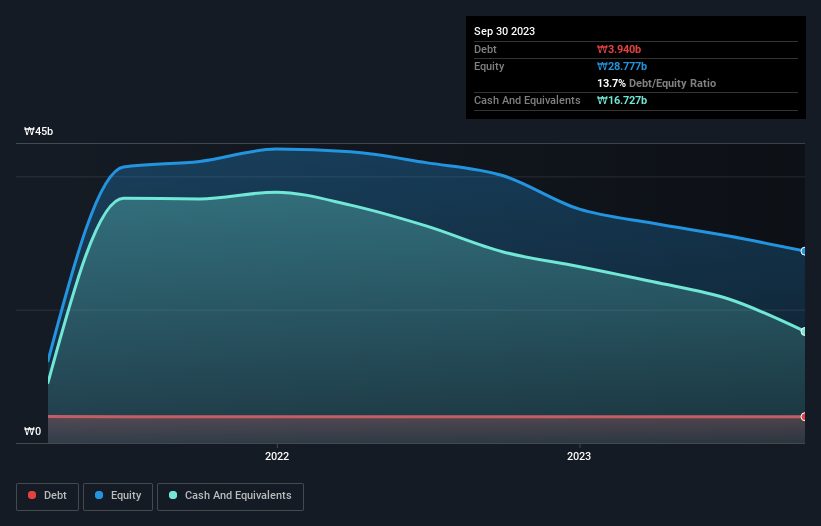Some say volatility, rather than debt, is the best way to think about risk as an investor, but Warren Buffett famously said that 'Volatility is far from synonymous with risk.' When we think about how risky a company is, we always like to look at its use of debt, since debt overload can lead to ruin. Importantly, Genesystem Co., Ltd. (KOSDAQ:363250) does carry debt. But should shareholders be worried about its use of debt?
When Is Debt A Problem?
Generally speaking, debt only becomes a real problem when a company can't easily pay it off, either by raising capital or with its own cash flow. In the worst case scenario, a company can go bankrupt if it cannot pay its creditors. However, a more frequent (but still costly) occurrence is where a company must issue shares at bargain-basement prices, permanently diluting shareholders, just to shore up its balance sheet. Of course, the upside of debt is that it often represents cheap capital, especially when it replaces dilution in a company with the ability to reinvest at high rates of return. When we examine debt levels, we first consider both cash and debt levels, together.
See our latest analysis for Genesystem
What Is Genesystem's Net Debt?
The chart below, which you can click on for greater detail, shows that Genesystem had ₩3.94b in debt in September 2023; about the same as the year before. However, it does have ₩16.7b in cash offsetting this, leading to net cash of ₩12.8b.

How Strong Is Genesystem's Balance Sheet?
According to the last reported balance sheet, Genesystem had liabilities of ₩2.06b due within 12 months, and liabilities of ₩4.40b due beyond 12 months. Offsetting this, it had ₩16.7b in cash and ₩1.21b in receivables that were due within 12 months. So it can boast ₩11.5b more liquid assets than total liabilities.
It's good to see that Genesystem has plenty of liquidity on its balance sheet, suggesting conservative management of liabilities. Because it has plenty of assets, it is unlikely to have trouble with its lenders. Succinctly put, Genesystem boasts net cash, so it's fair to say it does not have a heavy debt load! The balance sheet is clearly the area to focus on when you are analysing debt. But it is Genesystem's earnings that will influence how the balance sheet holds up in the future. So when considering debt, it's definitely worth looking at the earnings trend. Click here for an interactive snapshot.
In the last year Genesystem had a loss before interest and tax, and actually shrunk its revenue by 78%, to ₩1.6b. That makes us nervous, to say the least.
So How Risky Is Genesystem?
We have no doubt that loss making companies are, in general, riskier than profitable ones. And in the last year Genesystem had an earnings before interest and tax (EBIT) loss, truth be told. And over the same period it saw negative free cash outflow of ₩7.6b and booked a ₩11b accounting loss. But at least it has ₩12.8b on the balance sheet to spend on growth, near-term. Even though its balance sheet seems sufficiently liquid, debt always makes us a little nervous if a company doesn't produce free cash flow regularly. There's no doubt that we learn most about debt from the balance sheet. But ultimately, every company can contain risks that exist outside of the balance sheet. For instance, we've identified 4 warning signs for Genesystem (1 is potentially serious) you should be aware of.
At the end of the day, it's often better to focus on companies that are free from net debt. You can access our special list of such companies (all with a track record of profit growth). It's free.
New: Manage All Your Stock Portfolios in One Place
We've created the ultimate portfolio companion for stock investors, and it's free.
• Connect an unlimited number of Portfolios and see your total in one currency
• Be alerted to new Warning Signs or Risks via email or mobile
• Track the Fair Value of your stocks
Have feedback on this article? Concerned about the content? Get in touch with us directly. Alternatively, email editorial-team (at) simplywallst.com.
This article by Simply Wall St is general in nature. We provide commentary based on historical data and analyst forecasts only using an unbiased methodology and our articles are not intended to be financial advice. It does not constitute a recommendation to buy or sell any stock, and does not take account of your objectives, or your financial situation. We aim to bring you long-term focused analysis driven by fundamental data. Note that our analysis may not factor in the latest price-sensitive company announcements or qualitative material. Simply Wall St has no position in any stocks mentioned.
About KOSDAQ:A363250
Genesystem
A biotech engineering company, specializes in molecular testing solutions to target on-site testing needs.
Mediocre balance sheet with low risk.
Market Insights
Community Narratives



